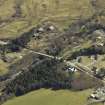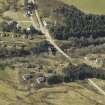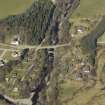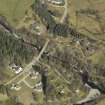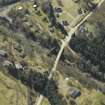Whitebridge, Old Bridge
Road Bridge (18th Century)
Site Name Whitebridge, Old Bridge
Classification Road Bridge (18th Century)
Alternative Name(s) White Bridge; Whitebridge, Wade Bridge; Whitebridge, Old Bridge Over River Foyers; River Fechlin
Canmore ID 12285
Site Number NH41NE 6
NGR NH 48915 15369
Datum OSGB36 - NGR
Permalink http://canmore.org.uk/site/12285
- Council Highland
- Parish Boleskine And Abertarff
- Former Region Highland
- Former District Inverness
- Former County Inverness-shire
NH41NE 6 48915 15369
White Bridge [NAT]
OS 1:10,000 map, 1975.
For present and successor bridge (adjacent to SE), see NH41NE 24.
For Whitebridge Hotel (Kingshouse, at NH 48706 15263), see NH41NE 8.
(Location cited as NH 489 154). White Bridge, built 1732, engineer General Wade. A tall semicircular rubble arch, with a pronounced hump, now by-passed by a stone-faced, concrete arch bridge (NH41NE 24).
J R Hume 1977.
A Wade bridge, built in 1732 and now disused. It is hump-backed with a tall round arch with raised keystones. Category A.
HBD No. 11 (undated note).
This Wade bridge, known as Whitebridge, was built in 1732. Although the nearby B682 and modern bridge have superseded it, this bridge is still accessible to pedestrians. Its condition seems to be fairly stable, although there is vegetation growing out of the stonework.
M Logie (Highland Council) 1997; NMRS, MS/1007/3.
This bridge carries the former line of the A862 public road (military road, NMRS MR 1) over the River Foyers (River Fechlin) immediately SE of the successor and present bridge (NH41NE 24).
The location assigned to this record defines the midpoint of the structure. The available map evidence suggests that it extends from NH c. 48899 15363 to NH c. 48929 15374.
Information from RCAHMS (RJCM), 6 April 2006.
Publication Account (2007)
White Bridge
(Institute Civil Engineers Historic Engineering Works no. HEW 2539/02)
This bridge, 9 miles north-east of Fort Augustus over the Fechlin and sometimes known as ‘9-mile bridge’, was constructed in 1732 on Wade’s later Great Glen road. It carried the road connecting the military garrisons at Inverness and Fort Augustus on a single tall semicircular arch of 40 ft span, founded on rock outcrops. Unlike most Highland bridges the arch-ring is of squared masonry with a decorative keystone and a string course
projects through the spandrels and follows the line of the roadway. The spandrels are of rubble masonry. Major William Caulfeild, road surveyor under Wade, probably supervised the work of construction.
The bridge has now been bypassed [see NH41NE 24]. The nearby Whitebridge Hotel is built on the site of a former King’s house used by the officers superintending road-making.
R Paxton and J Shipway, 2007.
Reproduced from 'Civil Engineering heritage: Scotland - Highlands and Islands' with kind permission from Thomas Telford Publishers.
Archaeological Evaluation (28 April 2010)
NH 4891 1537 An evaluation of the Category A listed 18th-century military bridge at Whitebridge was undertaken on 28 April 2010 prior to proposed repair work. The evaluation aimed to investigate the potential survival of the original road surface and to explore the working hypothesis that the surface of the bridge had been levelled from its original hump.
The two trenches opened on the SW side of the bridge established that the original road surface consisted of laid stone cobbles and survives at a depth of 0.55m at the approaches to the apex of the bridge. Several pipes and trenches clearly cross the bridge and have disturbed the original road surface. The investigation established that the original road surface has worn away (or been removed) at the apex of the bridge. Both trenches confirmed that later levelling material has been added to the surface of the bridge, perhaps in several stages.
Archive: Highland Council HER
Matt Ritchie and Bob Main – Wade Bridge of Whitebridge Trust


















































